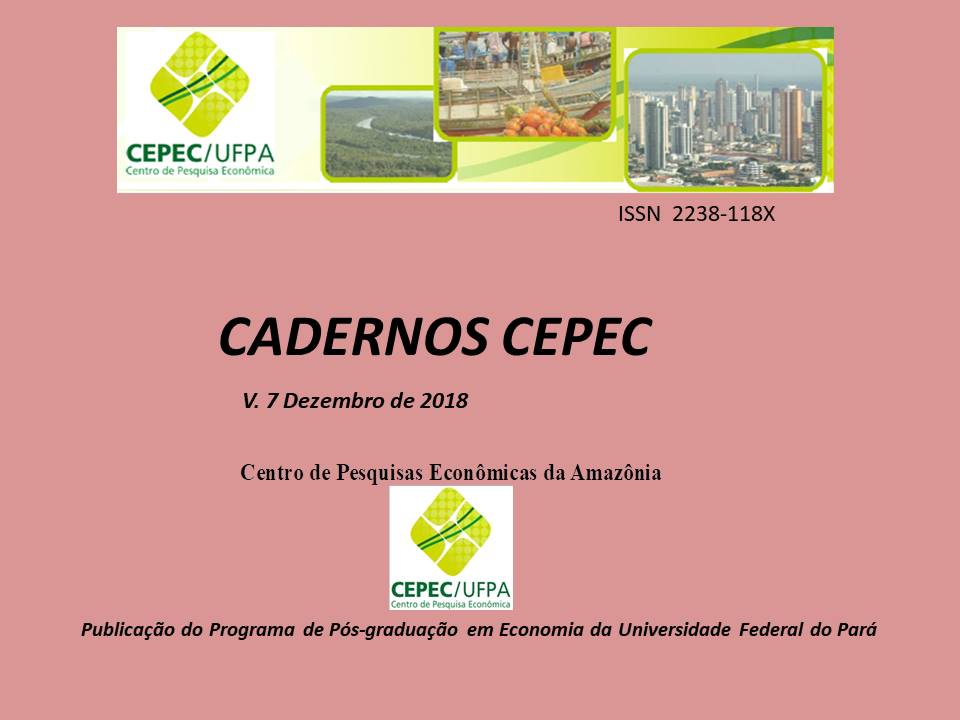GLOBAL TRENDS IN INCOME DISTRIBUTION: LONG-RUN INFLUENCES ON INCOME INEQUALITY
DOI:
https://doi.org/10.18542/cepec.v7i7-12.7077Palavras-chave:
Income inequality, Wage share, Wage dispersionResumo
This paper provides a comprehensive overview of the development in income distribution and outlines its major long-term trends of 23 countries worldwide. These countries are clustered in four groups covering the core advanced, the Nordic, the emerging, and the least developed economies of the world. This paper applies different measures to analyse income distribution in three dimensions: national income, functional income distribution, and personal income distribution. Depending on the indicators applied the time period ranges between 1960 and 2012. The empirical analysis shows that increases in national incomes are most pronounced in the advanced economies. The emerging economies also exhibit an upward trend in national income, but it has been less substantial. The least developed economies, however, have been detached from this trend and remain isolated. Moreover, this paper illustrates that there has been an enormous re-distribution of income. During the last three decades, the labour share of income has declined in nearly all countries under study. This development went hand in hand with increased personal income inequality. Disposable income inequality and market income inequality have both increased over the past 30 years. Wage dispersion also rose substantially contributing to greater income inequality. Additionally, the escalation of top income shares as well as the expansion of low paid employment has led to a growing gap between the top and the bottom income earners. This analysis also presents important interlinks between greater income inequality, the fall of the wage share, and increasing wage dispersion.Referências
ALVAREDO, F., ATKINSON, A. B., PIKETTY, T. & SAEZ, E. 2013. The Top 1 Percent in International and Historical Perspective. Journal of Economic Perspectives, 27, 3-20.
ANAND, S. & SEGAL, P. 2008. What do we know about global income inequality? Journal of Economic Literature, 46, 57-94.
ATKINSON, A. B., PIKETTY, T. & SAEZ, E. 2011. Top Incomes in the Long Run of History. Journal of Economic Literature, 49, 3-71.
Berg, Andrew; Ostry, Jonathan D., Zettelmeyer, Jeromin (2012): What makes growth sustained? In: Journal of Development Economics 98 (2), S. 149–166.
DUENHAUPT, P. 2011. The Impact of Financialization on Income Distribution in the USA and Germany: A Proposal for a New Adjusted Wage Share. Duesseldorf: IMK at the Hans Boeckler Foundation, Macroeconomic Policy Institute.
DUENHAUPT, P. 2013a. Determinants of functional income distribution - Theory and Empirical Evidence. GLU Working Papers No. 18 [Online]. Available: http://www.global-labour-university.org/244.html.
DUENHAUPT, P. 2013b. The effect of financialization on labor's share of income. IPE Working Paper No. 17. [Online]. Available: http://www.ipe-berlin.org/index.php?id=veroeffentlichungen.
GLYN, A. 2009. Functional distribution and inequality. In: SALVERDA, W., NOLAN, B. & SMEEDING, T. M. (eds.) The Oxford handbook of economic inequality. Oxford, New York: Oxford University Press.
GOODWIN, N. R., NELSON, J. A. & HARRIS, J. 2009. Macroeconomics in context, New York, ME Sharpe.
GUERRIERO, M. The labour share of income around the world: evidence from a panel dataset. Manchester, University of Manchester, Institute for Development Policy and Management (IDPM), 32/2012, 57.
HEIN, E. & MUNDT, M. 2012. Financialisation and the requirements and potentials for wage-led recovery : a review focussing on the G20. In: ORGANIZATION, I. L. (ed.). Geneva: International Labour Office.
HOPKIN, J. & BLYTH, M. 2012. What can Okun teach Polanyi? Efficiency, regulation and equality in the OECD. Review of International Political Economy, 19, 1-33.
HOWELL, L. 2013. Global Risks 2013. Insight Report - based on 2013 World Economic Forum. 8th Edition ed. Geneva.
ILO 2013a. Global Wage Report 2012/13. Geneva: International Labour Organisation.
ILO 2013b. World of Work Report 2013: Repairing the economic and social fabric. Geneva: International Labour Organization.
KHALID, M. 2013. Human Development Report: The Rise of the South. Human progress in a diverse world. New York: UNDP.
KRAEMER, H. 2010. The alleged stability of the labour share of income in macroeconomic theories of income distribution. Macroeconomic Policy Institute (IMK) Working Paper [Online], 11. Available: http://www.boeckler.de/pdf/p_imk_wp_11_2010.pdf.
KRUEGER, A. B. 1999. Measuring labor's share. American Economic Review, 89, 45-51.
MILANOVIC, B. 2006. Global income inequality: What it is and why it matters. World Bank Policy Research Working Paper.
NATIONS, U. 2012. Canberra Group Handbook on Household Income Statistics. 2nd ed. Geneva.
NATIONS, U. 2013. The Millennium Development Goals Report 2013. New York: United Nations.
OBST, T. 2013. Income inequality and the welfare state? How redistributive is the public sector? IPE Working Papers [Online], 29/2013. Available: http://www.ipe-berlin.org/index.php?id=veroeffentlichungen&L=1%27.
OECD 2011. Divided we stand: why inequality keeps rising, Paris, OECD.
OECD 2012. OECD Employment Outlook 2012. Paris: OECD Publishing.
ONARAN, O. & GALANIS, G. 2012. Is aggregate demand wage-led or profit-led? National and global effects. Geneva, OFFICE, I. L.
ORTEGA, D. & RODRIGUEZ, F. 2006. Are capital shares higher in poor countries? Evidence from industrial surveys. Manuscript, Corporacin Andina de Fomento (CAF) and IESA, and Department of Economics, Wesleyan University.
OXFAM. 2014. Working for the few. Oxfam Briefing Paper [Online], 178. Available: http://www.oxfam.org.
RODRIGUEZ, F. & JAYADEV, A. 2010. The declining labour share of income. Human Development Reports Research Paper. United Nations.
STIGLITZ, J. E. 2000. Economics of the Public Sector. New York, W.W. Norton.
STIGLITZ, J.E., SEN, A. & FITOUSSI, J.P., 2009. Report by the Commission on the Measurement of Economic Performance and Social Progress. [Online]. Available: http://www.stiglitz-sen-fitoussi.fr/en/index.htm.
STIGLITZ, J. E. 2012. The price of inequality: How today's divided society endangers our future, New York, WW Norton & Company.
THIRLWALL, A. P. 2003. The Nature of Economic Growth: An Alternative Framework for Understanding the Performance of Nations, Cheltenham, UK, Edward Elgar Publishing Ltd.
VOITCHOVSKY, S. 2011. Inequality and Economic Growth. In: NOLAN, B., SALVERDA, W. & SMEEDING, T. M. (eds.) The Oxford Handbook of Economic Inequality. Oxford, New York: Oxford University Press.
WILKINSON, R. & PICKETT, K. 2010. The Spirit Level: Why Equality is Better for Everyone. London, Penguin Books.


